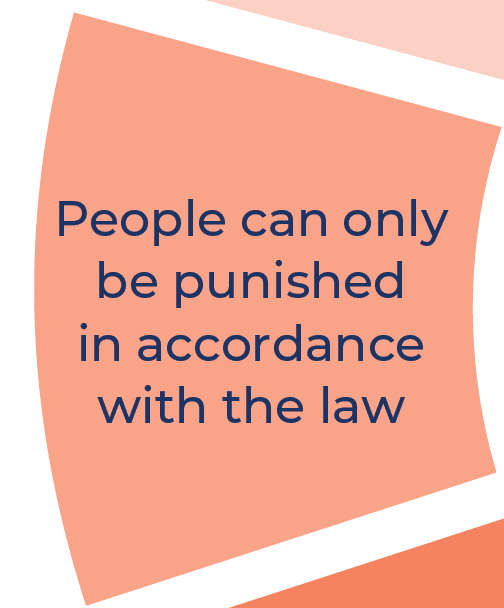People can only be punished in accordance with the law
In Australia, we have freedom under the law. This means people can only be punished for breaches of the law and in accordance with the law.
Citizens, corporations, groups, or any arm of the government cannot impose any punishment otherwise than in accordance with the law.
Governments often want to be seen to be tough on crime, but it is important that the punishment fits the crime and any new legislation does not impose overly harsh punishments. Under the rule of law, only the law can define a crime and prescribe a penalty.
The Australian criminal justice system is designed to protect community members and their property. It also protects innocent and vulnerable members of the community who are unable to protect themselves, such as children. The law envisages that people who are in breach the law can be punished by a variety of means, including fine, imprisonment and/or community service. Regardless, punishment must take place in a manner that is proportionate to the gravity of the offending behaviour, and to an extent and in a way that is just in all the circumstances.

It is better for the law to rule than one of the citizens … so even the guardians of the laws are obeying the laws. – Aristotle
What Does Freedom under the Law look like?
Firstly, the law must be sufficiently defined and government discretion sufficiently limited to ensure the law is not applied in an arbitrary manner.
It is important to understand what freedom under the law is all about. It does not mean we have a right to do and say whatever we like without fear of penalty. That is a recipe for anarchy.
The concept of freedom under the law is a deceptively simple concept that we inherited from Britain: in this Australia, we are free to do and say anything that is not prohibited by law.
Britain also gave us the associated idea that it is entirely legitimate for Parliament to impose restrictions on our freedoms. But those restrictions should only be imposed by clear laws enacted prospectively, not vaguely drafted rules that have the effect of handing arbitrary power to officials.
Within the boundaries of clear laws that have democratic legitimacy, we are therefore free to do what we like, even if this annoys those in power.
That is what it means to live in a free country.
Our approach is the opposite of what Americans disparagingly refer to as “prior restraint” – a system in which government officials have the authority to prevent actions without the need to satisfy a court that a law has been broken.
Freedom under the law does not mean open slather.
It accepts the legitimacy of restrictions when other goals are considered more important. But because our freedoms are so important, any restrictions should be specific, limited and enacted by parliament – not imposed by some official.
Legitimate restrictions may include restrictions on the dissemination of bomb-making instructions, the laws of contempt and defamation and the provisions in the Commonwealth Criminal Code that – in theory at least – make it an offence to praise acts of terrorism.
Those restrictions all have something in common: they are backed by specific laws that have been approved by parliament, are known in advance and can be changed as society’s circumstances change.
They make it possible for us to know exactly what we cannot say and to adjust our conduct to comply with the requirements of the law.
The proper role of government does not extend to prior approval. It is limited to setting clear boundaries in advance and imposing punishments if those boundaries are crossed.
Principles from the Magna Carta
From the Magna Carta we have the principle that we are ruled by the law and the law alone.
After sealing the Magna Carta in 1215, King John agreed that he could no longer throw someone in prison or torture anyone on a whim, or randomly punish them for an arbitrary reason. Punishment could only be for a breach in the law, and nothing else. The punishment must also be fair and fit the crime committed. This meant that no one could be tortured just because they displeased the King.
Clause 39: No free man shall be seized or imprisoned, or stripped of his rights or possessions, or outlawed or exiled, or deprived of his standing in any other way except by the lawful judgement of his equals or by the law of the land.
Watch our video on the principles of the rule of law that come from the Magna Carta.
